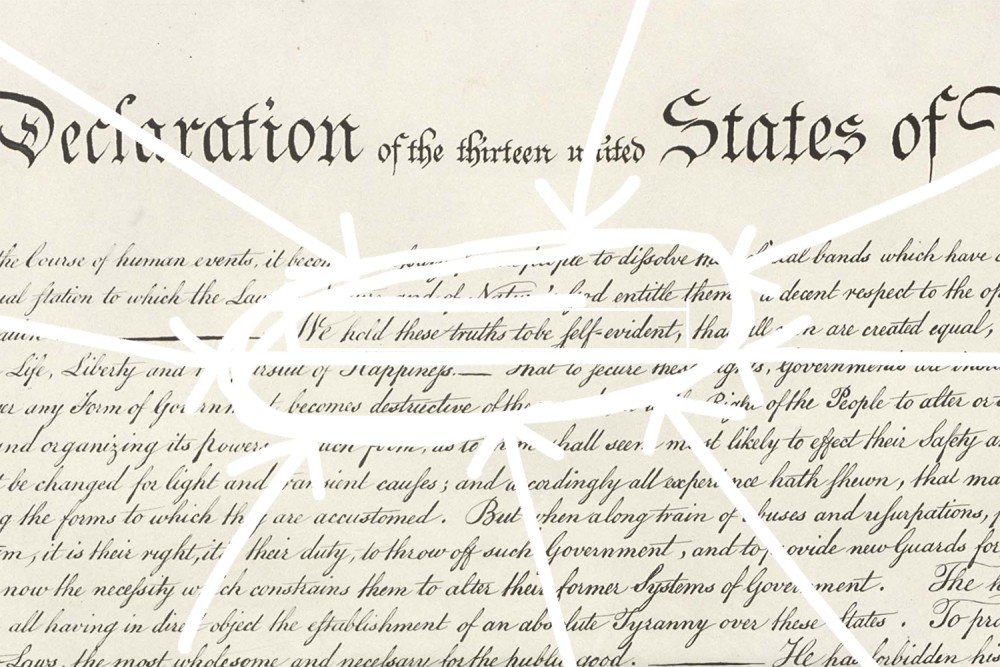Self-evident truths?
What may have been obvious to Thomas Jefferson was probably not obvious to those he enslaved.

(Century illustration)
If you want to patent a personal innovation of yours for which you wish to secure the rights, you’d be smart to learn about the doctrine of obviousness. It’s the most fundamental principle of patent law and the most commonly litigated issue in patent infringement cases. Section 103 of the US Patent Act bars the patenting of any invention that would have been obvious to a person of ordinary skill in the relevant field when the invention was created. This doesn’t mean every innovation must rise to the level of genius, or that old ideas assembled in new ways are prohibited from patent consideration. It only means that nonobviousness is a core requirement of patentability. The innovation must represent a substantial step beyond what is unmistakably evident, resoundingly clear, or plainly apparent to the ordinary mind.
In culture, politics, and everyday life, the obvious is often based on common sense. A set of values or ideas gains consensus to such a degree that serious people don’t bother questioning what they consider a settled matter that’s easily perceived or understood. A healthful diet and exercise yield healthier life outcomes than junk food and sloth. A Do Not Enter sign at the head of a one-way street can lead to tragedy if a driver willfully ignores it. Healthy relationships require respect. The results of a public election lacking serious irregularities deserve to be honored. These sorts of ideas all have the air of obviousness. They don’t need justification. They’re self-explanatory.
Read our latest issue or browse back issues.
The United States was founded on an appeal to obviousness. When Thomas Jefferson holed up in a Philadelphia house for two weeks in June 1776 to draft the Declaration of Independence, little could he have known that schoolchildren 250 years later would commit his words to memory as part of their regular schooling. “We hold these truths to be self-evident, that all men are created equal, that they are endowed by their Creator with certain unalienable Rights.” What could the slave-owning Jefferson have meant or intended by asserting that being created equal and being endowed with certain unalienable rights are self-evident truths?
Did Jefferson believe these truths to be beyond debate? Were they obviously true in some moral way? Not requiring of proof? Held to be unquestionable? Not needing justification? Basic common sense? We don’t know, though the exercise of trying to figure out what he meant by "self-evident" should prompt us to reevaluate how casually we often use the word obviously.
A couple of decades ago, art historian Amy Herman developed a seminar called The Art of Perception to sharpen the observation and analytical skills of professionals. Herman uses art to help people—from medical students to law enforcement to State Department officials—hone their visual literacy in a way that’s useful for their work. When she explains her rules for verbally describing a piece of art, she begins with this one: “There are two words that are not allowed—obviously and clearly—since what’s obvious to you may not be obvious to someone else.”
What may have been obvious to Thomas Jefferson was probably not self-evident to those who worked for him under forced subjugation. And given the way we still treat different members of society in our day, it’s still not obvious that we’re convinced of the truths that all people are created equal and endowed by their Creator with certain unalienable rights. So until such time as we’re ready to live these truths by adjusting our rhetoric, enacting laws that benefit all people more equitably, and ending our punishment of the poor for being poor, we probably ought to practice a little more reticence when suggesting certain truths are obvious or self-evident.






